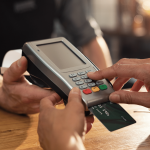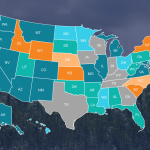An alarm system is an integral part of every retail establishment, but it is especially important for cannabis businesses. Though the requirements may be similar, regulations regarding alarm system devices for cannabis businesses are different in every state. In addition to differing state guidelines, the cost, quality, and functionality of alarm system devices can vary greatly. Cannabis business owners must consider all components of an alarm system before purchase and installation of alarm devices because it could have an impact on the long-term success of the business.
When choosing an alarm system for a cannabis business, owners should choose one that is made up of multiple alarm devices, including glass break detectors, motion detectors, and panic buttons. These devices each serve a different purpose and function but work in unison to provide layers of security. Even if one device fails to detect unauthorized access, another device will alert management of the intrusion.
Important Alarm Devices for Cannabis
A glass break detector signals the alarm if it detects glass breaking in its proximity. There are two types of glass break detectors: acoustic and shock. Acoustic detectors sense the high-frequency of breaking glass and can be mounted anywhere within about 20 feet of glass windows or doors. Shock detectors sense the vibration of breaking glass and must be attached to the glass they are monitoring. Though any cannabis business may utilize glass break detectors, dispensaries are more likely to have multiple windows and glass doors in need of securing while cannabis businesses like processors may not have any exterior glass.
Motion detectors are commonly used in alarm systems to detect unauthorized motion on the premises. Although there are many different kinds of motion detectors, passive infrared (PIR) detectors are some of the most commonly used. PIR motion detectors monitor the heat, or energy, released when individuals move within the device’s range. Motion detectors are frequently used by indoor businesses and head houses to monitor the premises as well as areas which may not have video surveillance.
Panic buttons are also customary in the alarm systems of many cannabis businesses and high-risk businesses like banks. These buttons signal an incident-in-progress to the alarm company and can be hard-wired or remote devices. Dispensaries may mount these devices underneath the sales counter within reach of cashiers and cultivators may use remote devices so that employees have access to the buttons throughout the facility or property.
Factors to Consider When Choosing Alarm Devices
Glass break detectors, motion detectors, panic buttons, and other alarm devices work together to secure a facility and detect unauthorized entry. While differing cannabis business license types may have distinct security needs for their alarm systems, these systems are often composed of the same catalog of alarm devices. The variations occur when it comes to determining how many devices are needed and where to locate them and it is crucial to have a licensed integrator perform the installation. Even the best alarm devices could fail if installed incorrectly.
There can be wide variations between the quality of alarm devices on the market that are advertised to serve the same function. These devices range in cost and effectiveness and their differences may not always be obvious. Additionally, not all alarm devices are compatible with each other, or with other systems in use at the business like the video surveillance system. It is important to hire or consult with an expert with experience with cannabis and security to ensure that the proper alarm system devices are installed correctly and compliantly.
How Can Sapphire Risk Help?
Tony Gallo and the team of application writers and consultants at Sapphire Risk Advisory Group have written hundreds of alarm system device plans and standard operating procedures for cannabis business applications. Follow us on social media to stay up to date with more security best practices and cannabis industry updates!
- First Experiences: What Our Interns Learned From Entering The Cannabis Industry

- California Senate Bill 69 Adds CEQA Requirements for New Cultivators

- Top 5 Cannabis Security and Surveillance Violations

- Peace of Mind in the Retail Sector: Facility Security

- Opportunities in the Ohio (O-High-O) Cannabis Market

- Building Security and Trust: Verifying Identification and Payments

- The Importance of Loss Prevention

- Thoughts to Improve Cannabis Security Regulations Across the Nation

- Opportunities in the Minnesota Cannabis Market

- U.S. Cannabis Legalization 2023 Update


